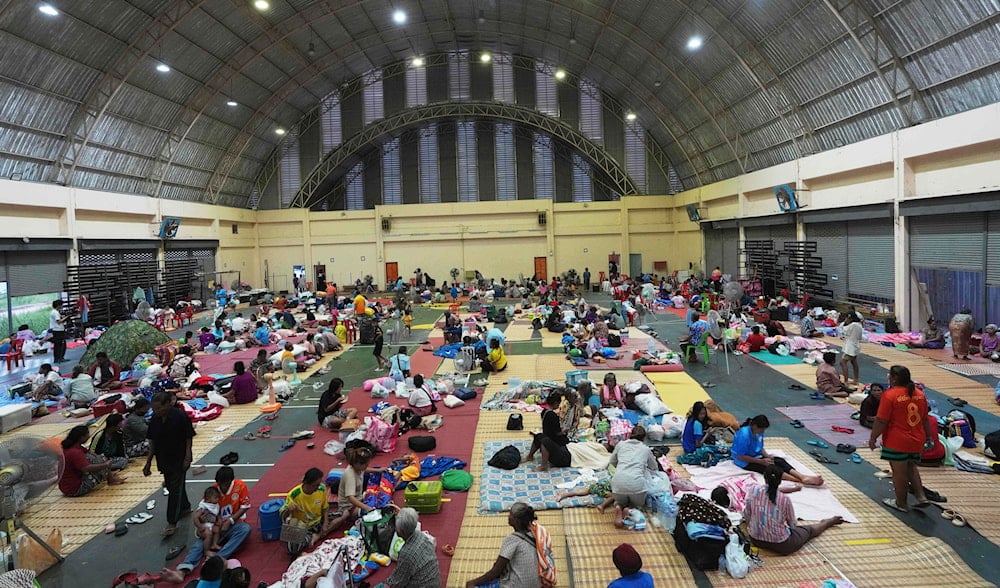Thailand-Cambodia border tensions displace 100,000 Thai civilians
Over 100,000 Thai civilians evacuated as the Thailand-Cambodia border tension escalates into deadly military clashes.
-

Thai residents who fled their homes following clashes between Thai and Cambodian soldiers rest at an evacuation center in Surin province, Thailand, Friday, July 25, 2025. (AP Photo/Sakchai Lalit)
Thailand has evacuated over 100,000 civilians from four provinces bordering Cambodia amid escalating Thailand-Cambodia border tensions, marking the deadliest military confrontation between the two nations in over a decade. The Thai Interior Ministry reported that 100,672 individuals had been moved to shelters, as artillery and rocket exchanges with Cambodian forces continued for a second consecutive day.
Thai military officials stated that Cambodian troops launched heavy bombardments using field artillery and BM-21 rocket systems early Friday in Ubon Ratchathani and Surin provinces. In response, Thai forces returned fire "in accordance with the tactical situation."
The Thai Health Ministry also confirmed 15 fatalities, including 14 civilians and one soldier. An eight-year-old boy was among the victims. Thirty-one others sustained injuries on Thursday. Cambodian sources, meanwhile, reported one civilian death and five injuries, with the evacuation of 1,500 families.
The clashes erupted across six locations spanning 209km of contested frontier, and both sides accuse the other of initiating hostilities in the disputed zones.
Thai response
Thailand's acting Prime Minister, Phumtham Wechayachai, condemned the attacks, stating, "We condemn this – using heavy weapons without a clear target, outside of conflict zones... the use of force and did not adhere to international law."
He emphasized Thailand's commitment to peaceful resolution while asserting the right to self-defense against what he called provocations. Thailand also reported that a hospital in Surin province was struck during the clashes. Health Minister Somsak Thepsuthin labeled the incident a potential "war crime."
WATCH: Video at Phanom Dong Rak Hospital (โรงพยาบาลพนมดงรัก) in Thailand as Cambodia launches attack. Reports of casualties. pic.twitter.com/DeXmy79nk8
— AZ Intel (@AZ_Intel_) July 24, 2025
Cambodian response
Cambodian officials have not released detailed casualty figures, but local authorities confirmed civilian evacuations. The Cambodian military denied initiating the conflict, accusing Thailand of an unprovoked incursion involving surveillance drones and armed troops.
Tensions surged after a Thai soldier lost a leg to a landmine in Ubon Ratchathani province on July 23. Thailand accused Cambodia of laying new mines, a claim Phnom Penh refuted the accusation, saying these were remnants from past conflicts. The incident triggered diplomatic fallout, with ambassadors recalled and relations downgraded.
Cambodia’s Ministry of National Defense’s account of the development leading to the border clashes on July 24. pic.twitter.com/JKUUBctfbt
— Cambodianess (@TTNEnglish) July 24, 2025
Historical roots of the dispute
The Thailand-Cambodia border conflict dates back to the 1907 Franco-Siamese Treaty, which attempted to demarcate territorial lines but led to disagreements, particularly over the location of ancient temples like Preah Vihear. While the treaty stipulated that borders should follow natural watershed lines, the accompanying map placed several Khmer temples, including Preah Vihear, on the Cambodian side of the watershed. Thailand initially accepted this map but later contested it upon discovering the discrepancy during its own surveys in the 1930s.
Thailand has long maintained that the temples, especially Preah Vihear, lie on its natural territory based on watershed geography and that the map annexed to the treaty was flawed. However, the International Court of Justice ruled in favor of Cambodia in 1962, citing Thailand's historical acceptance of the map. The ICJ reaffirmed this decision in 2013, granting Cambodia sovereignty over the promontory surrounding the temple and ordering Thailand to withdraw troops.
Border clashes have flared periodically, most notably between 2008 and 2013, when disputes over Preah Vihear and other historic sites like the Ta Moan and Ta Krabei temple complexes resulted in deadly confrontations.
The most recent escalation began in February 2025 following a confrontation at the Prasat Ta Muen Thom temple and was further inflamed by a leaked phone conversation between Thai Prime Minister Paetongtarn Shinawatra and former Cambodian Prime Minister Hun Sen. The ensuing scandal led to mass protests in Thailand and the prime minister's suspension on July 1.
International reactions and UN involvement
The UN Security Council is scheduled to convene on Friday to address the conflict. The US, a long-time Thai ally, called for an immediate cessation of hostilities. "We are gravely concerned by the escalating violence along the Thailand-Cambodia border and deeply saddened by reports of harm to civilians," said State Department deputy spokesperson Tommy Pigott.
Meanwhile, ASEAN Chair and Malaysian Prime Minister Anwar Ibrahim urged both parties to agree to an immediate ceasefire and offered to mediate.

 4 Min Read
4 Min Read










